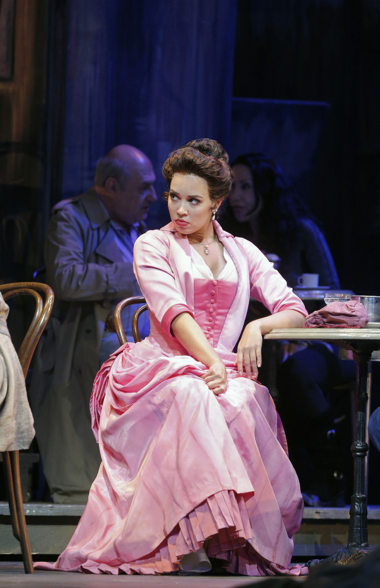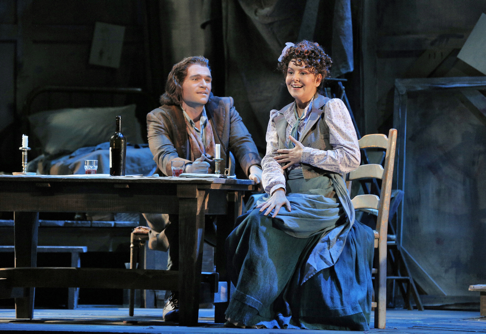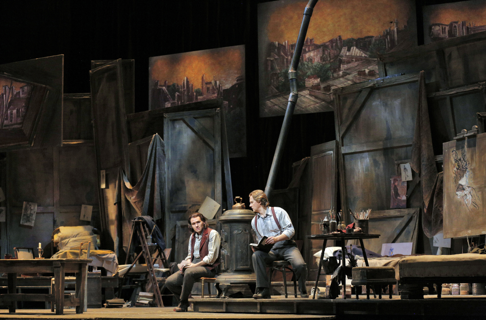
22 Nov 2014
La Bohème in San Francisco
First Toronto, then Houston and now San Francisco, the third stop of a new production of Puccini's La bohème by Canadian born, British nurtured theater director John Caird.
English Touring Opera are delighted to announce a season of lyric monodramas to tour nationally from October to December. The season features music for solo singer and piano by Argento, Britten, Tippett and Shostakovich with a bold and inventive approach to making opera during social distancing.
This tenth of ten Live from London concerts was in fact a recorded live performance from California. It was no less enjoyable for that, and it was also uplifting to learn that this wasn’t in fact the ‘last’ LfL event that we will be able to enjoy, courtesy of VOCES8 and their fellow vocal ensembles (more below …).
Ever since Wigmore Hall announced their superb series of autumn concerts, all streamed live and available free of charge, I’d been looking forward to this song recital by Ian Bostridge and Imogen Cooper.
The Sixteen continues its exploration of Henry Purcell’s Welcome Songs for Charles II. As with Robert King’s pioneering Purcell series begun over thirty years ago for Hyperion, Harry Christophers is recording two Welcome Songs per disc.
Although Stile Antico’s programme article for their Live from London recital introduced their selection from the many treasures of the English Renaissance in the context of the theological debates and upheavals of the Tudor and Elizabethan years, their performance was more evocative of private chamber music than of public liturgy.
In February this year, Albanian soprano Ermonela Jaho made a highly lauded debut recital at Wigmore Hall - a concert which both celebrated Opera Rara’s 50th anniversary and honoured the career of the Italian soprano Rosina Storchio (1872-1945), the star of verismo who created the title roles in Leoncavallo’s La bohème and Zazà, Mascagni’s Lodoletta and Puccini’s Madama Butterfly.
Evidently, face masks don’t stifle appreciative “Bravo!”s. And, reducing audience numbers doesn’t lower the volume of such acclamations. For, the audience at Wigmore Hall gave soprano Elizabeth Llewellyn and pianist Simon Lepper a greatly deserved warm reception and hearty response following this lunchtime recital of late-Romantic song.
Collapsology. Or, perhaps we should use the French word ‘Collapsologie’ because this is a transdisciplinary idea pretty much advocated by a series of French theorists - and apparently, mostly French theorists. It in essence focuses on the imminent collapse of modern society and all its layers - a series of escalating crises on a global scale: environmental, economic, geopolitical, governmental; the list is extensive.
For this week’s Live from London vocal recital we moved from the home of VOCES8, St Anne and St Agnes in the City of London, to Kings Place, where The Sixteen - who have been associate artists at the venue for some time - presented a programme of music and words bound together by the theme of ‘reflection’.
'Such is your divine Disposation that both you excellently understand, and royally entertaine the Exercise of Musicke.’
Amongst an avalanche of new Mahler recordings appearing at the moment (Das Lied von der Erde seems to be the most favoured, with three) this 1991 Mahler Second from the 2nd Kassel MahlerFest is one of the more interesting releases.
‘And there was war in heaven: Michael and his angels fought against the dragon; and the dragon fought and his angels, And prevailed not; neither was their place found any more in heaven … that old serpent … Satan, which deceiveth the whole world: he was cast out into the earth, and his angels were cast out with him.’
If there is one myth, it seems believed by some people today, that probably needs shattering it is that post-war recordings or performances of Wagner operas were always of exceptional quality. This 1949 Hamburg Tristan und Isolde is one of those recordings - though quite who is to blame for its many problems takes quite some unearthing.
There was never any doubt that the fifth of the twelve Met Stars Live in Concert broadcasts was going to be a palpably intense and vivid event, as well as a musically stunning and theatrically enervating experience.
‘Love’ was the theme for this Live from London performance by Apollo5. Given the complexity and diversity of that human emotion, and Apollo5’s reputation for versatility and diverse repertoire, ranging from Renaissance choral music to jazz, from contemporary classical works to popular song, it was no surprise that their programme spanned 500 years and several musical styles.
The Academy of St Martin in the Fields have titled their autumn series of eight concerts - which are taking place at 5pm and 7.30pm on two Saturdays each month at their home venue in Trafalgar Square, and being filmed for streaming the following Thursday - ‘re:connect’.
The London Symphony Orchestra opened their Autumn 2020 season with a homage to Oliver Knussen, who died at the age of 66 in July 2018. The programme traced a national musical lineage through the twentieth century, from Britten to Knussen, on to Mark-Anthony Turnage, and entwining the LSO and Rattle too.
With the Live from London digital vocal festival entering the second half of the series, the festival’s host, VOCES8, returned to their home at St Annes and St Agnes in the City of London to present a sequence of ‘Choral Dances’ - vocal music inspired by dance, embracing diverse genres from the Renaissance madrigal to swing jazz.
Just a few unison string wriggles from the opening of Mozart’s overture to Le nozze di Figaro are enough to make any opera-lover perch on the edge of their seat, in excited anticipation of the drama in music to come, so there could be no other curtain-raiser for this Gala Concert at the Royal Opera House, the latest instalment from ‘their House’ to ‘our houses’.
"Before the ending of the day, creator of all things, we pray that, with your accustomed mercy, you may watch over us."

First Toronto, then Houston and now San Francisco, the third stop of a new production of Puccini's La bohème by Canadian born, British nurtured theater director John Caird.
Mr. Caird is a very skilled director of theater and music theater. He is well credentialed in opera in Britain with productions at Welsh National Opera, his U.S. opera credits are productions at Houston Opera that have or will tour to other U.S. opera houses. Let us not overlook the Siefried and Roy show in Las Vegas (1991-2004).
Mr. Caird has created a slick, intelligent and successful production of La bohème. Typical of theater directors staging opera he has endeavored to keep the dramatic pace of the opera moving along, accelerating pace whenever possible. Scene changes are quick, intermissions are short, bows are choreographed. This with the apparent assumption that theater audiences need to keep their minds involved and music theater audiences need to keep the beat.
The opera audience has been conditioned over the past 300 years to stop time, to forget the story and sink into the elaboration of an emotion. So maybe for some of us in the War Memorial this Boheme seemed rushed and over-produced, even seemed condescending with lighting effects that were too obvious (as if we were incapable of feeling the music without its help).
Not even Rodolfo’s final cries were left as pure emotion — as the curtain fell on the dead Mimi he we see him transform the moment into words. We needed not feel the tragedy of this moment because it had become mere art — a tricky conceit. Maybe this Boheme was not for us, but for a music theater audience.
 Michael Fabiano as Rodolfo, Alexia Voulgaridou as Mimi
Michael Fabiano as Rodolfo, Alexia Voulgaridou as Mimi
Mr. Caird’s astutely perceived La bohème as four character sketches — the garret, the cafe, the square, and the death. In fact Marcello, an artist as well, is busily sketching the dead Mimi when the curtain falls. Each setting is created by a collage of canvas paintings (images of rooms and buildings). The colors and costumes were in the warm palate of late nineteenth century naturalistic painting. Scene changes were a vista, stagehands visible in a slick bow to Brechtian dogma (with no hint of advocacy). It was meant to please a broad audience and it did.
Finally though none of this mattered. The November 19 performance was memorable because of riveting performances by American tenor Michael Fabiano as Rodolfo and Russian baritone Alexey Markov as Marcello. Tenor Fabiano boasts the clean musicianship of his American training, and an innate sense of Italian line unaffected by mannerism. He made Puccini into heroic bel canto that fully satisfies verismo. Mr. Fabiano is a natural actor, his moves at once incorporating the physicality of singing with the emotive enthusiasms of a young poet.

Michael Fabiano as Rodolfo, Alexey Markov as Marcello
Though of Russian formation much the same can be said of baritone Markov whose Slavic colored voice added an international exoticism to this young painter as well as specific flavor to the Parisian ambiance. Both Fabiano and Markov have strong, focused, beautiful voices that sailed across the orchestra. These artists in fact provided the musical determination for the performance far more than did the leadership, or lack of, from the pit.
The November 19 Mimi was Greek soprano Alexia Voulgaridou. The internet offers no birthday for Ms. Voulgaridou and it would not matter except that her voice betrayed the mannerisms of a singer no longer in the bloom of youth, or in bloom at all, and you wondered why she was cast as Mimi. Was it the spate of Toscas she undertook in 2013 (even though Tosca and Mimi are completely different voices)? But these Toscas seem to have worn her out and have encouraged her to fall back on generic (stock) opera singer moves and gestures.
The November 19 Musetta was former Adler Fellow Nadine Sierra. She was a far more youthful Musetta than you would expect to see on a major stage, and of much lighter voice (she is a lyric coloratura). This fine young artist made Musetta memorable, her coquettishness absolutely convincing while she carved out director Caird’s imaginative new antics to “Quando men vo soletta per la via.” These antics however forced an unnaturally slow tempo that would challenge even a much larger voice.
On November 20 the Mimi was former Adler Fellow Leah Crocetto. She sings beautifully, but physically she is not appropriate to embody a consumptive heroine. You wondered why she was cast. Italian tenor Giorgio Berrugi sang Rodolfo. This young tenor with a good sound has unfortunately absorbed many mannerisms that associate him with proverbial Italian provincial opera. Soprano Ellie Dehn sang Musetta. She is a San Francisco Mozart heroine (Countess, Donna Anna, Fiordiligi) who could not possibly make the transition from stately womanhood to this coquettish character role. San Francisco Opera regular, baritone Brian Mulligan was Marcello, a fish-out-of-water as well.
Colline, Schaunard, and Benoit/Alcindoro were the same singers for both casts. Christian van Horn is San Francisco Opera’s catch all bass, one night Alidoro in Cenerentola, the next two nights Colline, then back to Alidoro. While a competent performer he does not approach the depths of character that these smaller but crucially important roles require.
The conductor was San Francisco Opera’s resident conductor Giuseppe Finzi. With the help of messieurs Fabiano and Markov he carried off November 19 honorably. On November 20 he could not bring the cast to musical cohesion. At both performances I longed for a conductor who felt verismo, not simply a maestro to accompany, or try to, the singers. Follow this link for an account of a performance by such a maestro: La bohème at San Francisco Opera.
Michael Milenski
Casts and production information:
Mimì: Alexia Voulgaridou; Rodolfo: Michael Fabiano; Musetta: Nadine Sierra; Marcello: Alexdy Markov; Colline: Christian van Horn; Schaunard: Hadleigh Adams; Benoit/Alcindoro: Dale Travis. Alternate cast: Mimì: Leah Crocetto; Rodolfo: Giorgio Berrugi; Musetta: Ellie Dehn; Marcello: Brian Mulligan. San Francisco Opera Chorus and Orchestra. Conductor: Giuseppe Finzi. Stage Director: John Caird; Production Designer: David Farley; Lighting Designer: Michael James Clark. War Memorial Opera House, November 19/20, 2014. Seats row M).